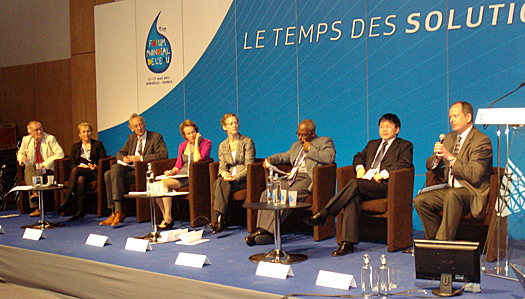WWF6 – Preservation of wetlands pays back in supply of food and fresh water


Hard water infrastructures get all the votes. Unlike natural infrastructures, like wetlands. There is a worldwide recognition to cherish wetlands because of their rich biodiversity. But only a few countries take the preservation of the special land and water ecosystem to practice.
At the session ‘Mind the gap’ at the 6th World Water Forum in Marseille on March 14, the organization Wetlands International took the lead in exploring the possibility to move onwards from the lip service to real preservation measures. Good water management can be the key solution as a good water quality makes a wetland an cheap supplier of food and fresh water.
Salt intrusion in dry periods
“In China there is hardly any attention for wetlands”, Chen Jin, vice president of the Changjiang water resource research institute told the participants of the session. Fish migration and the nesting of typical wetland birds are clearly manifest but according to Chen Jin the water quality is less visible. That makes it difficult to protect the ecosystem. He took the example of the Yangtze.
“China’s economy is growing fast and there is a great need for electricity. As hydropower is a clean energy source many reservoirs are being built along the river. The managers of these reservoir have no eye for the downstream wetland. So with little water come down the river, the salt intrusion in de delta of the Yangtze is a big threat to the ecosystem,” said Chen Jin.
Soft infrastructures no subject for vote getters
Vincent Sweeney coordinator of the Global programme of action for the protection of the marine environment from land-based activities (GPA) at UNEP, raised similar experiences along the East coast of Africa. “It is hard to talk about the protection of ecosystems if people need a place to life. Ecosystems are no hard infrastructure. There is no ribbon cutting ceremony for politicians to take votes. There is too little eye for the natural services delivered by the ecosystem.”
More understand for ecosystem services
Wetlands International challenged water managers at the World Water Forum to maintain the wetland ecosystem for the natural production of food and fresh water. Many solutions are at hand but in putting them to practice there is a gap.
According to Jane Madgwick, CEO of Wetland Internationals, there is clearly a need for multidisciplinary working for ecologist, water managers and spatial planners to coordinate their plans. “The key message needs to be communicated better. We need business cases to illustrate to ecosystem services of wetlands.”
Also read on this website
● WWF6 – Many successful meetings and presentations at Netherlands pavilion, 17 March 2012
● WWF6 – Even Dutch water authorities struggle with seasonal drought, 16 March 2012
● WWF6 – AGT offers Chinese delegation to jointly develop state-of-art dike management technology, 15 March 2012
● WWF6 – Global water governance hampered by sovereignty, 14 March 2012
● WWF6 – Delta alliance potential backbone for roadmap to resilient deltas, 14 March 2012
● WWF6 – Prince of Orange praises achievement MDG for drinking water, 13 March 2012
●WWF6: the Marseille meetings on unprecedented collaboration for safe water access, 12 March 2012
● WWF6: Unique Dutch delta act as solution for climate adaptation, 8 March 2012
More information
6th World Water Forum 2012 - Marseille
www.worldwaterforum6.org
Wetlands International
Wageningen, the Netherlands
+31 318 660 910
www.wetlands.org



